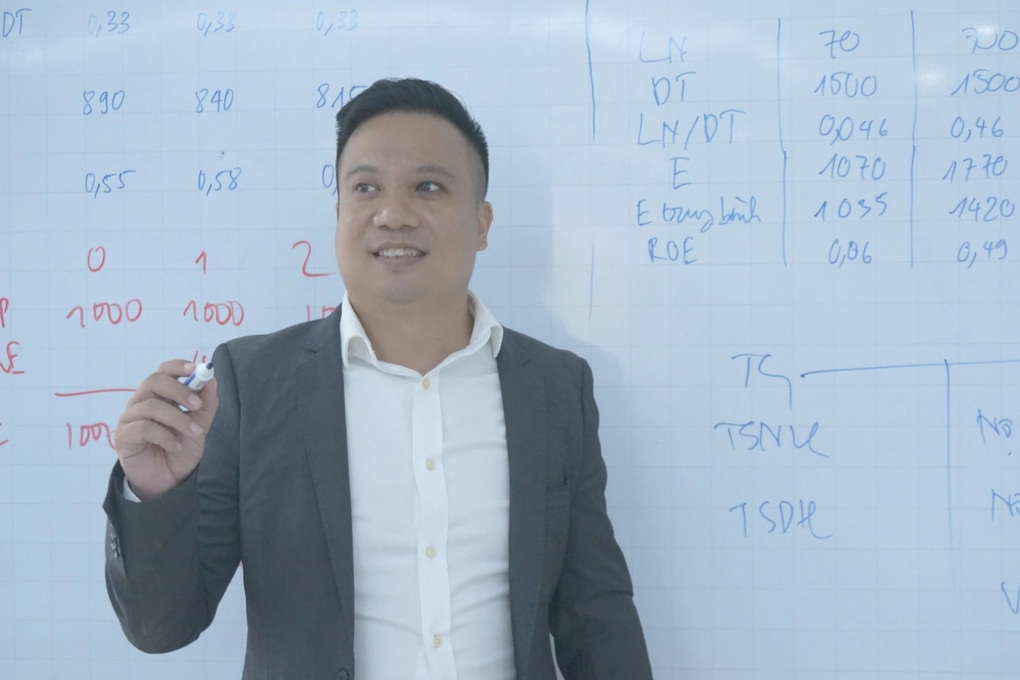According to a survey by Dan Tri reporters, the interest rates for 6-12 month term deposits currently listed by banks fluctuate around 3-6%/year. After a series of interest rate cuts by banks since the end of February, in the past few months, the number of units reducing interest rates has gradually decreased. Some banks have even started to increase deposit interest rates.
Meanwhile, the stock market is entering a "super wave" phase when the VN-Index continuously breaks peaks, at times approaching the 1,700-point mark - far surpassing the record of 1,528.47 points set on January 6, 2022.
In the last trading session of August, at one point, the VN-Index increased by 23.64 points (1.42%) to 1,688 points. Since the beginning of August, the index has increased by 185.5 points, equivalent to 12.35%, and compared to the beginning of the year, the increase exceeded 31%.

Investing is not only to increase income, but also a stepping stone to help young people get closer to big financial goals (Photo: Freepik).
According to a report from Techcom Securities (TCBS), in the first half of 2024, up to 56% of newly opened accounts belonged to investors under 30 years old. This ratio clearly reflects the shift of the younger generation from traditional savings habits to proactively seeking profitable opportunities and managing personal finances in a more flexible and modern way.
Risk control, disciplined investment
Minh Tu (born in 2003, HCMC) said she always prioritizes paying off debt first, then allocating it to living expenses and investments. After the initial losses when entering the stock market, Tu learned from experience, learned how to cut losses and built disciplined investment principles to protect capital and maintain a stable mentality in the face of market fluctuations.
Currently, Tu allocates 60% of her finances for investment and 40% for safe savings in cash and gold, only used when necessary. According to her, many young people easily fall into the state of FOMO (Fear of Missing Out) due to lack of knowledge and not doing thorough research before investing.
Similarly, Tuan Khoi (born in 2000 in Ho Chi Minh City) is a young man who is actively building a personal financial plan with the goal of owning his own house in the near future. Currently, he spends 10-20% of his monthly income on investment, with a starting capital of about 50 million VND.
For Khoi, investing is not only a way to increase income but also an important strategy to help him move faster towards his big financial goals.
"Although I have just started participating in the market, I have faced many difficulties, including a loss of about 25 million VND. However, that did not discourage me, but on the contrary, helped me learn many valuable lessons, consolidating my knowledge and investment experience," Khoi shared.
How should young people allocate their investment portfolio?
Sharing with Dan Tri reporter, Dr. Nguyen Dinh Dat, lecturer at Foreign Trade University, said that young people should prioritize building a reserve fund before thinking about investing. This fund is a "shield" to help them cope with unexpected risks such as job loss or illness, creating a secure financial foundation before entering the market.
In addition, he emphasized the role of investing in financial knowledge. Money management skills, market understanding and long-term thinking are required if you do not want to make mistakes when starting your investment journey. Once you have a reserve fund and basic knowledge, young people can start with a small amount of capital to take advantage of the power of compound interest.

Dr. Nguyen Dinh Dat, lecturer at Foreign Trade University (Photo: FTU).
According to Mr. Dat, one of the big risks for Gen Z is the “herd effect” mentality, especially through social networks. The obvious consequence is that FOMO makes many people buy at the top and sell when the market corrects, leading to losses. He warned that investing based on emotions instead of personal analysis will easily lead to mistakes.
To avoid falling into an emotional spiral, he recommends that young people need to control their psychology, stay calm and be patient with long-term strategies. Equipping themselves with knowledge from business analysis to market understanding will help young people invest more proactively and soberly.
When wondering whether to save or invest in the context of inflation, Mr. Dat said that saving brings short-term security, but investing is the long-term way to increase assets and protect the value of money. In particular, stocks are a suitable channel if equipped with knowledge and properly controlled risks.
For young people with small capital, he recommends starting with safe channels such as fund certificates or stocks of large, transparent enterprises. The initial goal is not to make quick profits, but to practice financial discipline, analytical thinking and emotional control - factors that determine sustainable success on the investment journey.
Finally, the expert concluded, with just a few hundred thousand dong, young people can get started. The important thing is not the amount of money, big or small, but the habit of investing regularly, constantly learning and committing to long-term goals such as financial freedom.
According to Dr. Nguyen Minh Phuc, Deputy Head of the Department of Corporate Finance (University of Finance - Marketing), with an average income of 8-12 million VND/month, young people should save and invest in parallel instead of choosing only one of the two.
This expert believes that the first step is to build a reserve fund equivalent to 3-6 months of living expenses. This amount should be saved to ensure value and help respond promptly to incidents such as job loss or illness.
Once they have a reserve fund, young people can start to learn and participate in investment channels to create passive income. If they have no experience, they can continue to save or choose safe products such as open-end fund certificates. In the long term, investing in the stock market is a potential direction, because young people have the advantage of time to overcome short-term fluctuations and accumulate sustainably.
Mr. Phuc recommends three core principles in investing: equipping oneself with knowledge before investing, knowing when to cut losses, and always diversifying one’s portfolio. In addition, understanding how the market works, knowing how to analyze financial reports, and selecting information will help young people invest independently, avoiding herd mentality and false rumors.
With a capital of 50-100 million VND, young people should allocate it reasonably, 10% invested in themselves through books and courses; 60-70% in safe channels such as savings, fund certificates - prioritizing VN30 simulation funds or Blue-chip stocks. The remaining (20-30%) can be invested directly in stocks, choosing 1-2 codes of leading enterprises with strong finances to practice and learn.
Source: https://dantri.com.vn/kinh-doanh/nguoi-tre-moi-di-lam-nen-chon-tiet-kiem-hay-dau-tu-20250902090527930.htm




![[Photo] Prime Minister Pham Minh Chinh launched a peak emulation campaign to achieve achievements in celebration of the 14th National Party Congress](https://vphoto.vietnam.vn/thumb/1200x675/vietnam/resource/IMAGE/2025/10/5/8869ec5cdbc740f58fbf2ae73f065076)

![[Photo] Prime Minister Pham Minh Chinh chairs the Government's online conference with localities](https://vphoto.vietnam.vn/thumb/1200x675/vietnam/resource/IMAGE/2025/10/5/264793cfb4404c63a701d235ff43e1bd)




















































![[VIDEO] Summary of Petrovietnam's 50th Anniversary Ceremony](https://vphoto.vietnam.vn/thumb/402x226/vietnam/resource/IMAGE/2025/10/4/abe133bdb8114793a16d4fe3e5bd0f12)

![[VIDEO] GENERAL SECRETARY TO LAM AWARDS PETROVIETNAM 8 GOLDEN WORDS: "PIONEER - EXCELLENT - SUSTAINABLE - GLOBAL"](https://vphoto.vietnam.vn/thumb/402x226/vietnam/resource/IMAGE/2025/7/23/c2fdb48863e846cfa9fb8e6ea9cf44e7)



































Comment (0)